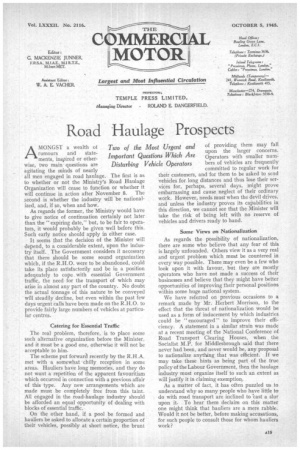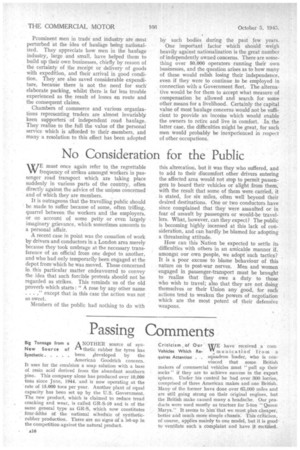Road Haulage Prospects
Page 17

Page 18

If you've noticed an error in this article please click here to report it so we can fix it.
AMONGST a wealth of rumours and statements, inspired or otherwise, two main questions are agitating the minds of nearly all men engaged in road haulage. • The first is as to whether or not the Ministry's Road Haulage Organization will cease to function or whether it will continue in action after November 8. The second is whether the industry will be nationalized, and, if so, when and how.
As regards the former, the Ministry would have to give notice of continuation certainly not later than the "expiring date," but, to be fair to operators, it would probably be given well before this. Such early notice should apply in either case.
It seems that the decision of the Minister will depend, to a considerable extent, upon the industry itself. The Government considers it necessary that there should be some sound organization which, if the R.H.O. were to be abandoned, could take its place satisfactorily and be in a position adequately to cope with essential Government traffic, the need for the transport of which may arise in almost any part of the country. No doubt the actual tonnage of this nature to be conveyed will steadily decline, but even within the past few days urgent calls have been made on the R.H.O. to provide fairly large numbers of vehicles at particular centres.
Catering for Essential Traffic The real problem, therefore, is to place some such alternative organization before the Minister, and it must be a good one, othenvise it will not be acceptable to him.
The scheme put forwara recently by the R.H.A. met with a somewhat chilly reception in some areas. Hauliers have long memories, and they do not want a repetition of the apparent favouritism which occurred in connection with a previous affair of this type. Any new arrangements which are made must be completely free from this taint. All engaged in the road-haulage industry should be afforded an equal opportunity of dealing with blocks of essential traffic.
On the other hand, if a pool be formed and hauliers be asked to allocate a certain proportion of their vehicles, possibly at short notice, the brunt of providing them may fall upon the larger concerns. Operators with smaller numbers of vehicles are frequently committed to regular work for their customers, and for them to be asked to send vehicles for long distances and thus lose their services for, perhaps, several days, might prove embarrassing and cause neglect of their ordinary work. However, needs must when the devil drives, and unless the industry proves its capabilities in this direction, we cannot see that the Minister will take the risk of being left with no reserve of vehicles and drivers ready to hand.
Some Views on Nationalization As regards the possibility of nationalization, there are some who believe that any fear of this is largely unfounded. Others view it as a very real and urgent problem which must be countered in every way possible. There may even be a few who look upon it with favour, but they are mostly operators who have not made a success of their businesses and believe that they might have better opportunities of improving their personal positions within some huge national system.
We have referred on previous occasions to a remark made by Mr. Herbert Morrison, to the effect that the threat of nationalization would be used as a form of inducement by which industries could be " encouraged " to improve their efficiency. A statement in a similar strain was made at a recent meeting of the National Conference of Road Transport Clearing Houses, when the Socialist M.P. for Middlesbrough said that there never had been, and never would be, any proposal to nationalize anything that was efficient. If we may take these hints as being part of the true policy of the Labour Government, then the haulage industry must organize itself to such an extent as will justify it in claiming exemption.
As a matter 6f fact, it has often puzzled us to understand why so many people who have little to do with road transport are inclined to 'cast a slur upon it. To hear them declaim on this matter one might think that hauliers are a mere rabble. Would it not be better, before making accusations, for such people to consult those for whom hauliers work? Prominent men in trade and industry are most perturbed at the idea of haulage being nationalized. They appreciate how men in the haulage industry, large and small, have helped them to build up their own businesses, chiefly by reason of the certainty of the receipt or delivery of goods with expedition, and their arrival in good condition. They are also saved considerable expenditure, because there is not the need for such elaborate packing, whilst there is far less trouble experienced as the result of losses ea route and the consequent claims.
Chambers of commerce and various organizations representing traders are almost invariably keen supporter g of independent road haulage. They realize to the full the value of the personal service which is afforded to their members, and many a resolution to this effect has been adopted by such bodies_ during. the past few years. One important factor which shonld weigh heavily against nationalization is the great number of independently owned concerns. There are something over 50,000 operators running their own businesses, and the question arises as to how many of these would relish losing their independence, even if they were to continue to be employed in connection with a Government fleet. The alternative would be for them to accept what measure of compensation be allowed and search for some other means for a livelihood. Certainly the capital value of most haulage concerns would not be sufficient to provide an income which would enable the owners to retire and live in comfort. In the latter case, the difficulties might be great, for such men would probably be inexperienced in respect of other occupations.




















































